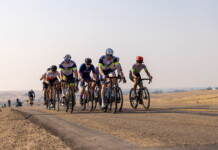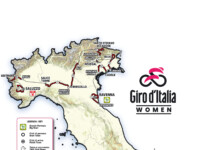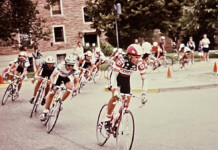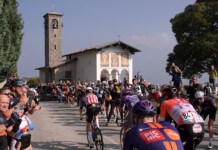America’s longest, one-day sanctioned bicycle race features 203 miles and ‘strict’ Covid-19 guidelines
Layton, Utah — The 38th annual LoToJa Classic will depart from Logan, Utah, on September 12, 2020 with 1,250 cyclists pedaling to Wyoming’s Jackson Hole under extensive Covid-19 safety guidelines.
LoToJa begins at Sunrise Cyclery in Logan and ends at Jackson Hole Mountain Resort for licensed racers (203 miles/327 kilometers) and Jackson Hole High School for cyclosportive riders (198 miles/319 kilometers). The nearby 13,776-foot high Grand Teton greets cyclists as they cross either finish line.
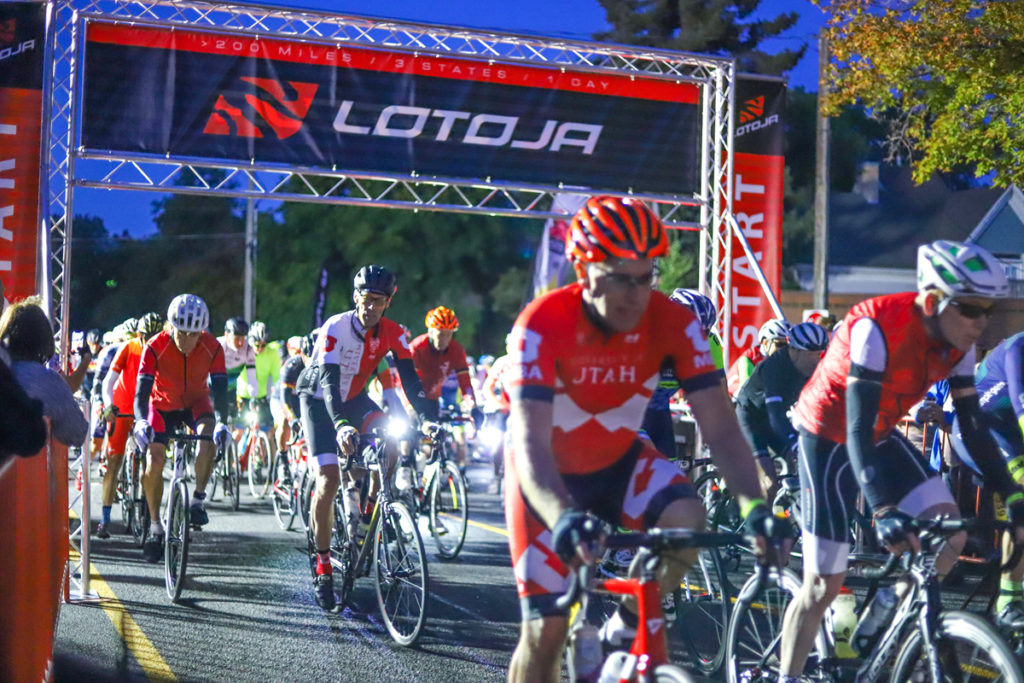
Cyclists ride the entire course in one day on scenic back roads through northeastern Utah, southeastern Idaho and western Wyoming. Along the way they pedal through Utah’s Cache Valley, Idaho’s Preston and Montpelier, and Wyoming’s Afton and Alpine Junction in Star Valley before reaching Jackson Hole.
Three mountain passes that total 35 miles and almost 10,000 vertical feet of climbing are also encountered.
LoToJa is recognized as the longest, one-day USA Cycling sanctioned road race in America. After nearly 40 years of existence, it is one of the nation’s most popular cycling events with a focus on fundraising for worthy causes.
Several thousand riders from across the U.S. and foreign countries register every April, but less than 2,000 are accepted to keep safety and the quality of the cycling experience at a premium. LoToJa’s popularity is fueled by its challenging distance, scenery, and finish line in one of America’s most popular visitor destinations in the West.
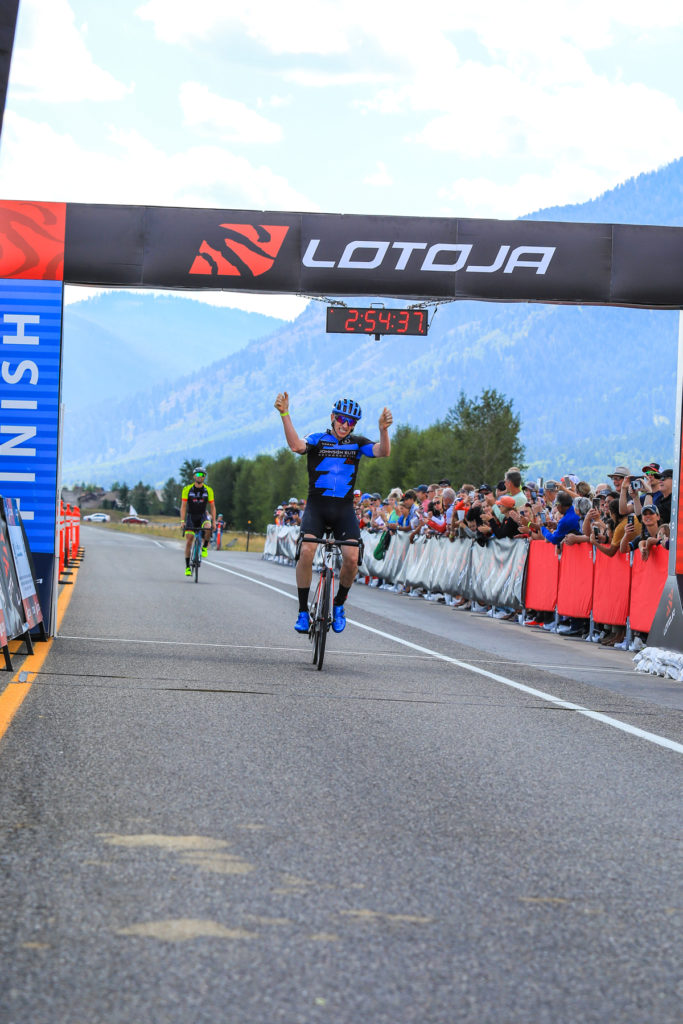
LoToJa almost joined the long list of major cycling events across the U.S. that have been canceled or postponed this year due to the Covid-19 pandemic. But because of enthusiastic support from riders, sponsors and community leaders, the decision was made to run the event with strict “Covid-19 Adaptations,” said LoToJa Race Director Brent Chambers.
“Although we’re in the midst of a global pandemic, we have worked tirelessly to plan for and implement several comprehensive safety adaptations to mitigate the health risks of riders, support crews, and the communities that LoToJa passes through,” Chambers said.
“We have applied CDC and local and state health department recommendations in our preparations,” he added. “With them in place, we have done what health experts say are effective to mitigate Covid-19 transmission.”
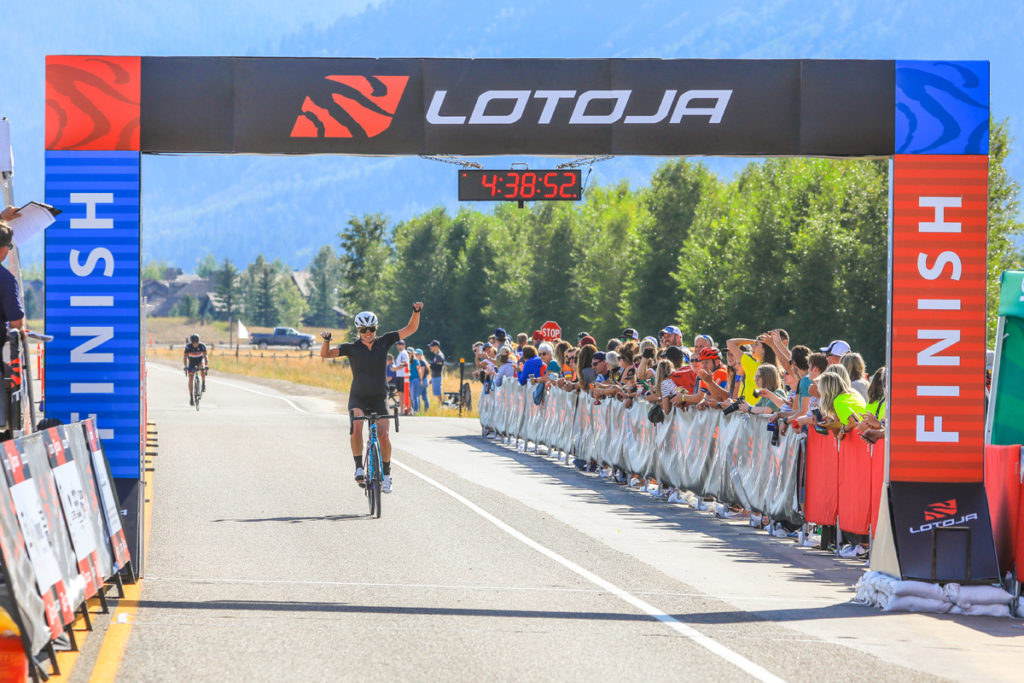
Chambers said it is his perspective that the “pandemic will be with us for longer than anticipated while vaccines and treatments are developed and accepted by the public. Meanwhile, we shouldn’t stop living life. We can adapt with effective health safety measures, and keep the race moving forward.”
In addition to mandatory facial masks, hygiene and social distancing, Chambers’ Covid-19 Adaptations include more than 50 specific health safety actions and requirements that further minimize human contact during LoToJa. Key points include Covid-19 screening for all cyclists, no indoor gatherings, smaller groups leaving the start line, more and enlarged feed zones to increase social distancing, and all neutral feed zone staff to wear PPE and distribute food and hydration products to cyclists from behind protective barriers. Hand sanitizer will also be everywhere.
Cyclists are allowed to remove masks while on the road. A complete list of the Covid-19 Adaptations, along with other event-related information, can be viewed at www.lotoja.com.
Chambers said this year’s LoToJa is essentially two events in one. The change significantly reduces the number of cyclists and support crews at the start line, on the road, through communities on course, at feed zones, the two finish lines, and at the awards ceremony. The start line area has also been enlarged to further increase social distancing between riders.
He said the success of this year’s event is dependent upon the choices and cooperation of every cyclist and his or her support crew to follow the Covid-19 Adaptations. That includes volunteers, vendors and sponsors, too. He stressed the effort is about creating a great experience for everyone, not just a few.
“LoToJa is committed to do whatever it takes to keep everyone as safe as possible,” Chambers said. “Likewise, we expect all participants to follow all event guidelines.”
Those who don’t will be disqualified and potentially banned from future LoToJa’s, he said.
The men’s and women’s course records weren’t broken during last year’s race due to strong headwinds. Spencer Johnson’s winning time of 8:18:29 in 2018 took more than 24 minutes off the previous men’s course record of 8:42:31 that was set in 2017. The women’s course record of 9:35:00 was set in 2013 by Melinda MacFarlane.
Most other cyclists take 10-13 hours to ride LoToJa, with some coming in as late as 8:30 p.m. when the finish line closes. But despite pedaling all day, many return every year.
LoToJa began in 1983 by two Logan cyclists who wanted to create an enduring one-day bicycle race. They modeled it after European professional cycling’s five grand monuments: Milan-San Remo, Ronde van Vlaanderen, Paris-Roubaix, Liege-Bastogne-Liege, and the Tour of Lombardy.
In LoToJa’s first year, seven cyclists competed and crossed the finish line near downtown Jackson. The winner was Bob VanSlyke of Logan who finished the 186-mile course in 9 hours. In 1986 the finish line was moved to Jackson Hole Mountain Resort, which pushed the race’s distance to over 200 miles.
Since then LoToJa has become one of America’s premier amateur cycling races. It has also become a major fundraiser for the Huntsman Cancer Foundation and other health-related organizations. More than $2 million has been contributed to Huntsman alone by cyclists and sponsors. LoToJa also sponsors local fund-raising groups that assist the event.
Chambers said this year’s LoToJa again features multiple categories for USA Cycling license holders, plus a cyclosportive rider class, which consists of non-licensed cyclists who are either competing against riders within their age group, or are just riding for fun. A relay race and categories for tandem riders are also held.
This year’s race will have 600 course volunteers, which includes 125 Ham radio operators from the Bridgerland Amateur Radio Club, he said. They provide uninterrupted communication throughout LoToJa’s mountainous and remote terrain.
Chambers stressed LoToJa wouldn’t be possible without its volunteers and the cooperation and assistance it receives from businesses, civic leaders, public safety officials and community volunteers.
He also emphasized that LoToJa’s top goal is to have a safe race for all cyclists, support crews and volunteers. Motorists traveling on LoToJa’s course on Sept. 12 are asked to use caution when approaching cyclists. Groups consisting of several riders may be present.
To further increase safety on race day, the Idaho Transportation Department will restrict eastbound traffic on state Route 36 north of Preston between Riverdale and Ovid from 6 a.m. to 12 p.m. Eastbound traffic on US-89 between Montpelier and the Wyoming state line will also be restricted from 8 a.m. to 2 p.m.
The temporary travel restrictions are used to add an extra layer of safety for cyclists, Chambers said. Motorists are asked to use caution while traveling on these two roadways during LoToJa. Cautious passing is advised to ensure safety for everyone.
Chambers defined “cautious passing” as slowing down, giving at least three feet of space between the vehicle and cyclist(s), and patiently waiting for oncoming vehicle traffic to clear before pulling around a cyclist or group of cyclists.
LoToJa cyclists, plus their support crews, well-wishers, event staff and volunteers, represent an entourage of approximately 3,000 people, Chambers said. Several of the communities through which LoToJa passes organize roadside fundraisers to capitalize on the influx of visitors. The host cities of Logan and Jackson also enjoy a welcomed economic boost from the race, specifically restaurants and hotels.
According to Chambers, it is estimated more than 20,000 cyclists have pedaled more than 6 million miles during LoToJa since the race began 38 years ago.
“After all these years, LoToJa is still a remarkable event that touches the soul of everyone who races or rides it,” Chambers said. “To cross the finish line is an achievement that not only enhances people’s lives — it changes them for the better. Who wouldn’t after riding 200-plus miles in a day across some of the most breathtaking landscape in the American West? LoToJa is about celebrating life and the power and resilience of the human spirit. In times like these, we need to be reminded of that.”
LoToJa’s route and additional information about the race are available at lotoja.com.

